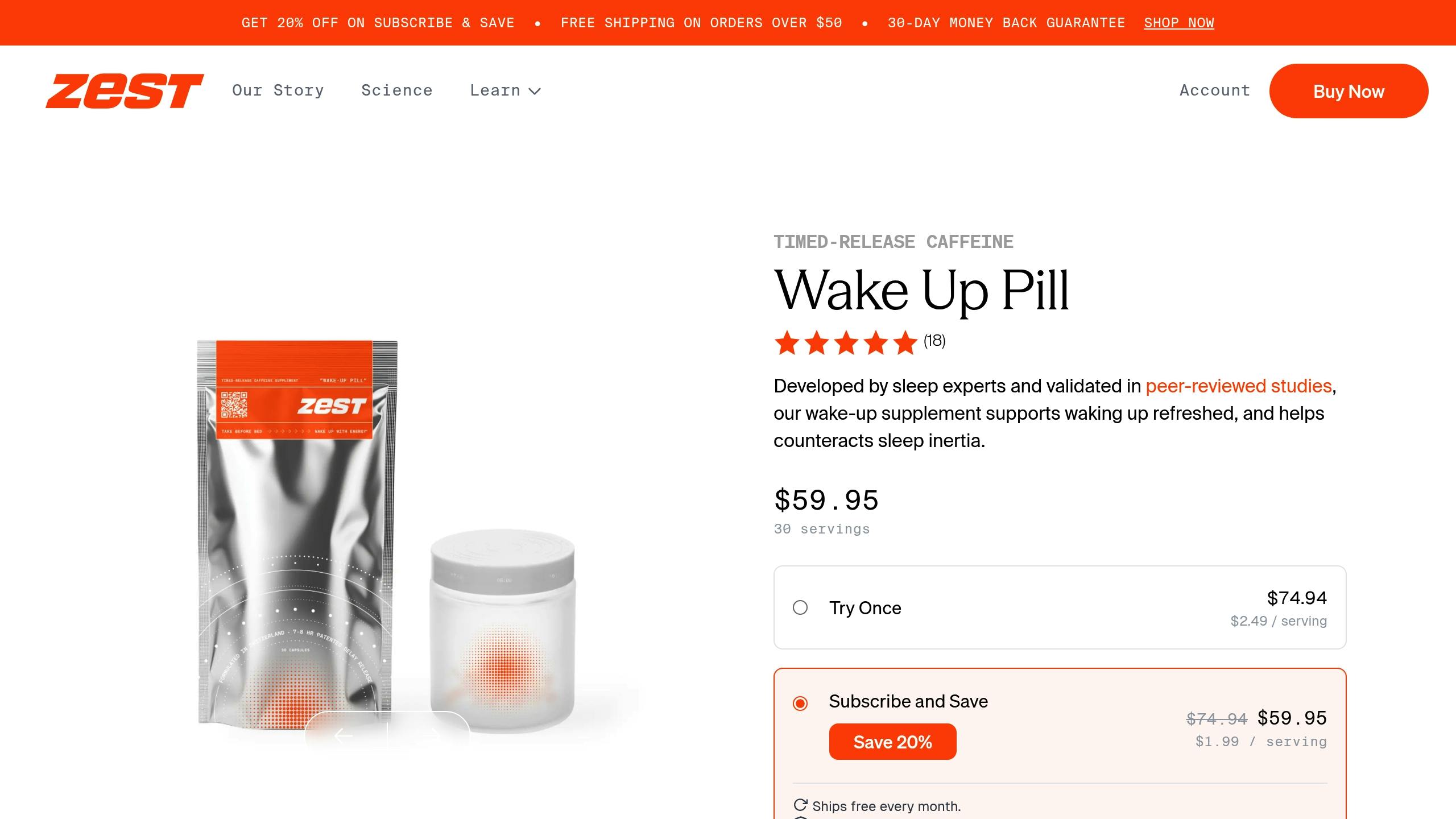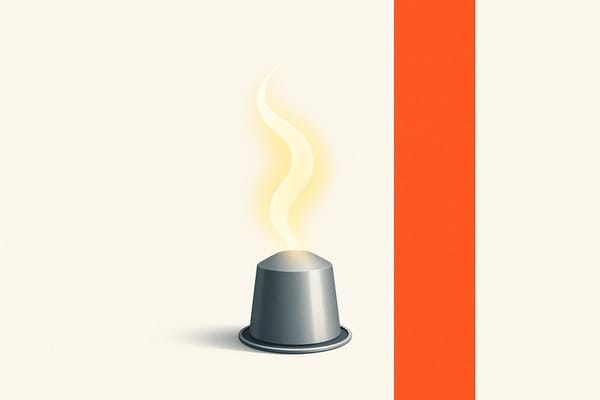Why You Shouldn’t Delay Your Morning Caffeine - What The Science Says
Drinking coffee immediately after waking can enhance energy levels and reduce grogginess, challenging common caffeine timing advice.

Drinking coffee right after waking up might be better than waiting. The recent advice circulating on social media to delay your morning caffeine by 90-120 minutes is not strongly supported by science. In fact, research directly contradicts many of the claims behind this trend.
Numerous studies reveal that:
- Cortisol levels follow their natural rhythm regardless of when you drink coffee in the morning. Delaying caffeine 90 minutes after you wake up does not meaningfully alter your body's hormonal response throughout the day. Additionally, if you are a regular caffeine user, which is most of us, you are less likely to see a significant cortisol spike following ingestion.
- Adenosine does not decline upon waking — it is primarily cleared during sleep. The claim that delaying caffeine helps adenosine “clear”, or having caffeine immediately blocks adenosine from clearing, is biologically inaccurate.
- Caffeine works best when consumed early, as it can better bind to adenosine-receptors post-sleep and is also more effective in immediately reducing sleep inertia symptoms when you wake up. This is why the “coffee nap” works – the caffeine is able to better bind to adenosine receptors because the nap clears out the adenosine.
- Afternoon energy crashes are more about meal timing, hydration, and caffeine amount, as opposed to caffeine timing. The idea that early caffeine causes a later crash is a myth.
For a smoother energy boost, consider options like Zest's time-release caffeine, which provides steadier energy and reduces crashes compared to regular coffee. For a smoother energy boost, consider options like Zest's time-release caffeine, which provides steadier energy and reduces crashes compared to regular coffee.
| Feature | Regular Coffee | Zest (Time-Release) |
|---|---|---|
| Energy Duration | 2-3 hours | 4-6 hours |
| Peak Caffeine Levels | Quick spike (12 mg/L) | Sustained (8 mg/L) |
| Afternoon Crashes | Common | Reduced (83% fewer) |
| Acid Reflux Impact | Standard | 58% less |
Skip the wait and enjoy your morning coffee when you wake up - it’s better for your body’s natural rhythm.
The Science of Morning Caffeine Timing
How Cortisol Works in Your Body
One of the biggest claims behind delaying caffeine is that it prevents interfering with the body’s natural cortisol rhythm. But this argument is misleading. Cortisol naturally peaks in the morning, and caffeine does increase cortisol secretion—but habitual coffee drinkers (those consuming ~200mg daily) develop a tolerance that minimizes this interaction. In fact, for those who consume 300-600mg of caffeine daily, this cortisol response may be abolished completely.
The idea that delaying caffeine prevents "extending" the cortisol peak is also flawed. Caffeine will still cause a rise in cortisol even if you delay intake, meaning the timing doesn’t make much difference. If avoiding cortisol spikes were truly a concern, then morning workouts should also be discouraged—yet research overwhelmingly supports early exercise for energy and metabolism.
Adenosine and Sleep Inertia: The Science Says Otherwise
The claim that adenosine continues to decline for hours after waking is biologically inaccurate. Adenosine is rapidly cleared during sleep, and upon waking, it begins to accumulate again, not decrease. This completely debunks the idea that delaying caffeine allows for "natural adenosine clearance."
Instead, caffeine is most effective in blocking adenosine right after waking, making early consumption the best way to reduce morning grogginess.
Afternoon Energy Crashes: Facts vs. Myths
Many believe that drinking coffee early in the morning leads to an afternoon crash, but there is no evidence supporting this. Research suggests that crashes are influenced far more by meal timing, hydration, and caffeine metabolism, not when you had your first coffee.
If afternoon fatigue does occur, the simplest solution is to consume a second dose of caffeine in the early (not late) afternoon, which does not negatively impact the hypothalamic-pituitary-adrenal (HPA) axis or sleep patterns.
Benefits of Early Morning Caffeine
Fighting Morning Grogginess
Caffeine can be a quick fix for that sluggish feeling you get after waking up. Research highlights its ability to block adenosine, the compound responsible for sleepiness. A study by the Walter Reed Army Institute of Research found that military personnel who consumed 200mg of caffeine immediately after waking had 18% faster reaction times and scored 29% higher on vigilance tests compared to those who delayed their caffeine intake.
Morning Energy and Peak Performance
Drinking coffee early in the morning works well with your body’s natural rhythms. According to research in the European Heart Journal, people who drink coffee only in the morning had a 16% lower risk of all-cause mortality and 31% less likely to die of cardiovascular disease compared to those who consumed it throughout the day and those who did not drink coffee. This challenges the idea that delaying caffeine is better, showing instead that early consumption supports your body’s natural processes.
For athletes, the timing of caffeine matters even more. Having caffeine within 30 minutes of waking can boost workout power and velocity output significantly, thanks to improved blood flow.
"Morning-type coffee patterns show significant mortality risk reduction", says Dr. Lu Qi, referencing findings from his NHANES analysis.
Products like Zest's timed-formula are designed to complement your natural cortisol rhythm, helping maintain steady energy levels and addressing afternoon fatigue. Additionally, the extended release component of the formula helps sustain energy levels for hours without the crash.
Zest's Time-Release Caffeine System

How Time-Release Technology Works
Zest uses a patented pH-sensitive release system designed to match your body's natural cortisol rhythm. Unlike regular coffee, which delivers a quick caffeine surge within 45 minutes, Zest's system gradually releases caffeine over 3-4 hours. This is achieved through pH-sensitive coatings that activate in the small intestine.
Here's the science: Zest maintains a steady caffeine concentration of 8 mg/L, compared to the 12 mg/L spikes caused by coffee. This helps you stay alert without the dreaded energy crash.
| Characteristic | Zest | Regular Coffee |
|---|---|---|
| Peak Time | 9-10 hours after ingestion | 45-90 minutes after ingestion |
| Peak Concentration | 8 mg/L sustained | 12 mg/L spike |
| Duration of Effect | 4-6 hours | 1-2 hours |
| Gastric Impact | Less acid reflux | Standard impact |
Conclusion
Recent research debunks the idea that delaying your morning caffeine intake offers any real benefits. The widely shared advice to wait 90-120 minutes after waking is based on misconceptions about cortisol, adenosine, and energy crashes.
Zest offers a compelling alternative to regular coffee. Its patented timed-release system, backed by clinical trials, tackles both early-morning grogginess and the need for lasting energy. By delivering caffeine steadily instead of in a quick burst, Zest helps you avoid the afternoon crashes that often come with traditional coffee.
Instead of focusing on unproven timing rules, the real game-changer is choosing caffeine solutions that sustain energy and align with your body's natural rhythms.
Bottom Line: Skip the delay—your morning coffee is best enjoyed right away.
Antonio, Jose et al. “Common questions and misconceptions about caffeine supplementation: what does the scientific evidence really show?.” Journal of the International Society of Sports Nutrition vol. 21,1 (2024): 2323919. doi:10.1080/15502783.2024.2323919 https://pmc.ncbi.nlm.nih.gov/articles/PMC10930107/#s0015






